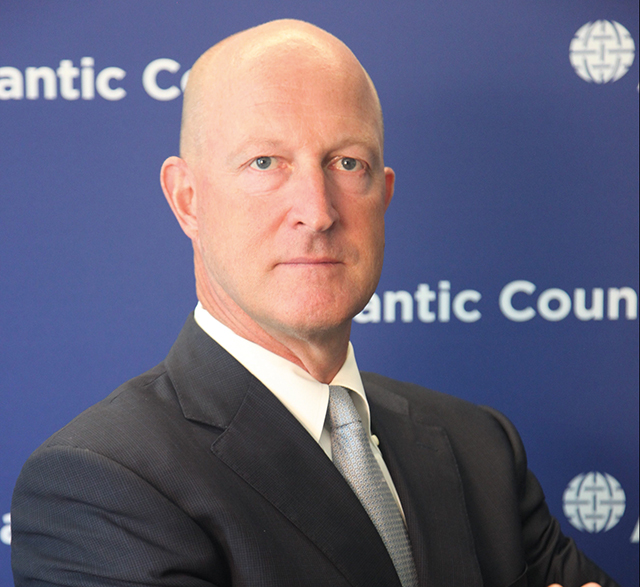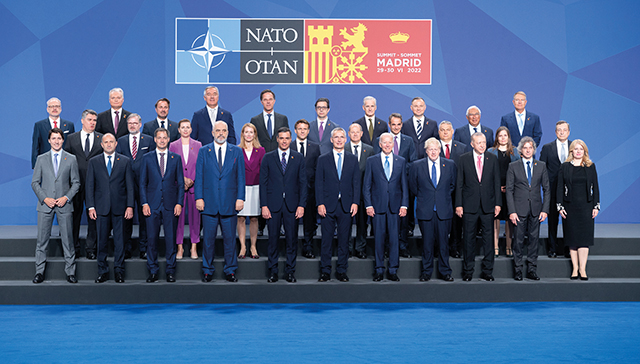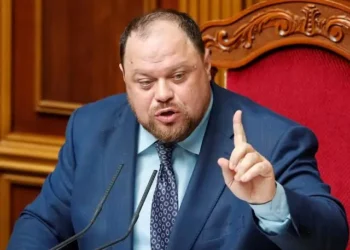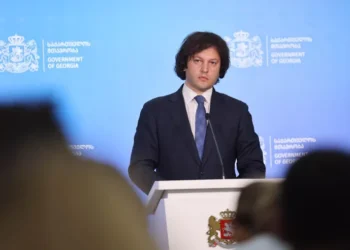Ian Brzezinski, Senior Fellow at the Atlantic Council, Former Deputy Assistant Secretary of Defense for Europe and NATO Policy, spoke to RFE / RL on US and EU military aid, deterring Putin, and Georgia’s chances of joining NATO.
President Biden announced new US military deployments to Europe, which includes a permanent HQ for the US 5th Army Corps in Poland, an additional rotational brigade to Romania, and “enhancing” rotational deployments in the Baltics. What’s your take?
It’s significant but not necessarily sufficient. What it is is a significant step forward. And certainly a major reversal of what has been the post-Cold War trend of withdrawing forces from Europe. It is still primarily a tripwire defense that they have. Those of us advocating for a posture of deterrence by denial may be a little bit disappointed with this outcome, but we have to recognize it as a step forward. I would want to know more about what the Europeans are deploying and if these forces are being complemented.
What we should be doing is creating an international force to go in and secure the uncontested territory of Western Ukraine
Secretary Stoltenberg declared that they’re going to expand the size of the NATO Response Force. I was involved in the creation of that Force back in 2002-2004. They’re increasing the size of it from 40,000 personnel to 300,000, which is a good move, adding muscle to the Alliance’s deterrent posture. But there’s a big difference between declarations and delivery. For decades, NATO has been questioning whether the Response Force was really ready for the full spectrum of operations to which it was committed. And that was underscored by the fact there was never a full scale exercise of the Response Force. So one thing I’ll be looking for is how they are going to be monitoring the readiness levels of those forces.
I would like to have seen a permanent presence in Poland (beyond the HQ) and the Baltics. And at minimum by some West European allied forces- German, French, British, Pole, Romanian, etc. It’s very important that these structural adjustments not be predominantly American contributions, but truly Transatlantic contributions for the defense of NATO’s Eastern frontier.

The NATO declaration says “Russia is the most significant threat to the allies’ security and peace”. Is that realization coming a bit too late?
Late, but better late than never. If we’d this Strategic Concept five or six years earlier, we might have been better postured in the region. And that might have actually prevented us from entering the current situation we face today, the war in Ukraine.
We saw a greenlighting of Sweden and Finland’s NATO membership. How does this tie in with the Kremlin narrative that they’re stopping NATO expansion?
It destroys that narrative. What Putin has done is deepened the West’s ties to Ukraine, which is his primary target. His second invasion of Ukraine, and particularly the brutality of the way he’s applied force against Ukraine, was a profound wake-up call for the Finns and the Swedes and shaped their application for NATO membership. And it’s caused a significant shift in the geopolitical landscape of Europe by taking two countries whose cumulative territories amount to almost two Germanys. It’s expanded the border between NATO and Russia by another 1000 miles. Even though the Western community controlled 95% of the Baltic Sea, because Sweden and Finland were not aligned, that sea could still be contested by Russia. Now the Baltic Sea has become a de facto NATO Lake, and it has significantly grown the Alliance’s ability to defend and enhance the security of the three Baltic states.
President Erdogan strong-armed Sweden and Finland into accepting his conditions in exchange for Turkey’s greenlight. Were Stockholm and Helsinki forced to make a choice between values and hard security?
No, I think it was a fairly reasonable exchange and negotiation between the two parties. Turkey is a member of NATO. NATO allies export weapons to Turkey. The US has been selling F16 and other equipment to Turkey, we were ready to sell them the Patriot system. So I can understand the Turks coming in asking, “why are we going to admit somebody into our special community with an arms ban on us?” It’s a very legitimate issue for the Turks to raise. It’s a little bit more complex when it comes down to Turkey’s, or rather, Erdogan’s relationship with the Kurds.
Our failure to respond decisively to the aspirations of these two countries has been provocative to the Putin ambiguity
But it sounds like the Finns and Swedes got a reasonable compromise pounded out on this trilateral statement they’ve made. It’s a significant step forward, bringing the accession process of Sweden, Finland into a new phase, which is potentially the ratification process. That said, Turkey still has to go through the process of ratifying and that will give it more room for further negotiations. I hope the Turks won’t exploit that opportunity. But, based on Erdogan’s track record, I wouldn’t be surprised if he tries. In the end, I think Turkey will stand by NATO and facilitate this accession, because it’s in Turkey’s interests too.
This confirms NATO’s long standing narrative that the door remains open, though it seems more open to some than others.
I’m not comfortable saying that Sweden and Finland’s NATO accession shows that NATO’s doors are open. In fact, it raises concerns for me when these two countries, who only in the last three months applied for NATO membership, all of a sudden get fast-tracked into the Alliance when a country like Ukraine, which is a democracy and has been acting as a de-facto NATO ally, as well as Georgia, don’t. I remember the photographs of Georgian soldiers sitting on a rooftop under fire defending the US Embassy in Kabul- it underscored how seriously committed Georgia was to NATO and the Transatlantic community. This all also shows that the door isn’t fully open, and it’s a mixed signal to the Ukrainians that that their aspirations aren’t as warmly embraced, particularly when they’re shedding blood in defense of the West, in defense of NATO’s own interests.
The right thing for the Alliance to have done this Summit would have been putting Ukraine on the membership track. Russia can’t be allowed to knock a country off the NATO accession track by simply invading or attacking it. We cannot afford to give Russia that sort of veto.
As to how far down the agenda the war has plunged Ukraine and Georgia’s NATO membership bids, I’m trying to balance my hopes and desire to see these countries join NATO against reality. I’ve been a long standing supporter of the aspirations of these two democracies. But it’s clear that the conflict has made it harder for many in the West to seriously consider the aspirations of the two because they don’t want to bring an ongoing war into the Alliance which would essentially trigger an Article Five commitment to war. Because this is against Russia, it comes with dangerous escalatory dynamics.
In some ways, Russia’s aggression has been a direct hit against or serious impediment to the aspirations of both countries to join the Alliance. In the eyes of some, would moving forward these requests further provoke Russia? I think that’s a mistaken conclusion. I think our failure to respond decisively to the aspirations of these two countries has actually been provocative to the Putin ambiguity.
The West’s response to Putin’s nuclear threats has actually been destabilizing to international security
Putin walked away from the Bucharest Summit in 2008 feeling the West was not committed to Ukraine or Georgia, that it was an opportunity for him and his territorial ambitions. But the West has been highly animated over the last three months by the courage and tenacity of the Ukrainians. You can’t turn on the news and not be moved by the sacrifices, the courage, the determination, the commitment of the Ukrainians in their battle against the Russians. Those are the fighters, people, nation you want to have in your ranks. It’s underscored the validity of the aspirations of these two countries, and the benefits they would bring to the Alliance. But I have to ask, has this helped more or hurt more? In the geopolitics of today, I’d have to say it hurts more.
Foreign Minister Kuleba, at the Davos Summit, said NATO is “doing practically nothing to help Ukraine.” Is that a deserved chastising?
Yes. NATO was not formally involved in helping Ukraine. Its engagement in Ukraine has served as a forum for very important and very useful discussions on how the West can help Ukraine, but the assistance itself has come through member countries, because some governments of NATO falsely believe adding a NATO dimension to the assistance to Ukraine would be provocative to Putin and feed his narrative. I don’t know why we’re worried about Putin’s narrative. When the Alliance doesn’t participate, formally, in support of Ukraine, it signals weakness and division. It emboldens Putin. The Alliance cannot afford to look like it’s intimidated by him.
How does the Western military assistance compare with what Russia has?
These are systems that should have been delivered long time ago. Incrementalism has defined the West’s support to Ukraine. Our economic sanctions have been incremental; our security assistance has been incremental. This stuff should have been flowing, these actions should have been taken when the Russians were marching their forces against Ukraine back in March, April, May of last year. Every so often, we add another economic sanction, but Russia is still sucking in billions of dollars every week from the sale of its commodities abroad. The EU alone has spent some $90 billion on Russian oil and gas since the war started. That’s not cutting off an economy, that’s financing the invasion of a neighbor that you’re providing security assistance to. It is morally wrong and strategically short sighted. And it’s perpetuating this war at the cost hundreds of Ukrainian lives every day: soldiers, civilians who are killed, maimed or displaced. And that incrementalism is characteristic of the Western strategy against Putin’s hegemonic aspirations. It communicates a lack of commitment, lack of determination. It communicates a lack of unity. As a result, it emboldens Putin on to pursue his objectives even more aggressively. We’ve got to start acting decisively, we owe it to the Ukrainians.
In February, you argued that President Biden should consider sending troops to Western Ukraine as a deterrent. What would have that brought about?
It would have demonstrated the West is committed to Ukraine’s security, in sharp contrast to having our ambassador, staff and military pack their bags and hustle out of Western Ukraine, a signal that showed a total lack of confidence in Ukraine, in the viability Ukraine’s armed forces. It served almost like a red flag in front of a bull, encouraging Putin to move forward with his attack. If we had deployed forces to Western Ukraine, it would have demonstrated resolve and determination, and it would have complicated Putin’s military planning, because he wouldn’t know what those forces would really be doing. It would have helped deter that invasion. We did the opposite. We signaled fear in the face of a threatened or impending invasion.
What we should be doing is creating an international force to go in and secure the uncontested territory of Western Ukraine, making a humanitarian no conflict zone, not to fight in, but to provide a safe haven for the refugees the invasion created. The Ukrainians would rather be in Ukraine than abroad. That way, we’d ensure the territorial perpetuation of the Ukrainian state, not flirt with the idea of a captive nation, which we definitely are right now, which would be the end of Ukraine, Ukraine would be overrun by a state intent on exterminating the existence of not only the Ukrainian state, but the Ukrainian language, Ukrainian history and Ukrainian culture – that is Putin’s trademark. Ask the Chechens.
Such a humanitarian safe-zone would allow the Ukrainians to more effectively concentrate their forces against the Russians. Right now, they’re spread around almost the entirety of their country, and that spreading reduces their effectiveness at the fulcrum of Russia’s invasion, which today is in the east.
Detractors would say this would bring the West into a direct military conflict with Russia.
There is no option without risk. And the option we’re pursuing today has risks, because it’s allowing the Russians to grind down the Ukrainians. Even with all the assistance we provide, time is not on the side of the Ukrainians; the Russians have so much mass, and the brutality of their leader, his willingness to sacrifice his own forces, makes me concerned about what will be the long-term consequences of a continued conflict. The idea I’m proposing wouldn’t involve attacking Russian forces. The decision for a Russian engagement with Western forces would be entirely Putin’s. And he’d have to decide whether or not he wants to take on a far more capable force than the Ukrainians. My guess is that if he’s struggling as badly as his forces are against the Ukrainians, the last thing he wants to do is start a firefight with Allied forces.
The West says it doesn’t want a military confrontation with a nuclear power.
It’s not in Putin’s interest to have a nuclear war. He’d be very worried about how the West will respond to that, and it would be severe, the minimum probably resulting in a significant degradation of Russia’s capabilities in Ukraine. Putin could not eliminate from his calculus the possibility that the West will respond with a counterstrike against Russian territory. And why would you want to detonate a nuclear weapon in a neighboring country when the winds would just bring the fallout back into Russia? There are many reasons why such an escalation is not in Putin’s interest.
The West’s response to Putin’s nuclear threats has actually been destabilizing to international security. This is the first time I know of where NATO and the US have decided not to engage in a particular conflict because they’ve been threatened by nuclear weapons. What are the lessons Putin is learning from this? He’s escalated his rhetoric, and when that happens, that actually increases the likelihood of such weapons being used; we’re conditioning him to believe he can get what he wants through such threats. Others, like China, are also learning of the utility of nuclear threats when it comes to the pursuit of territory. They will be watching carefully, particularly those flirting with the idea of acquiring nuclear weapons themselves.
Interview by Vazha Tavberidze














